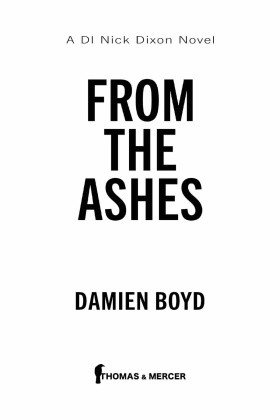It was still dark outside, the glow from the streetlights creeping around the curtains.
‘How’s Rod?’
‘He’s all right.’ Jane was in the kitchen, dog biscuits dropping into a tin bowl sending Monty running in. ‘He’s insisting on coming to the stag do; won’t be able to drink though.’
‘Good. He can keep an eye on me.’
‘When is it?’
‘The Saturday before. Roger’s been on to the place in Lynmouth and it’s fine. He’d postponed it rather than cancelled.’
‘Did you ask him about the baby’s remains?’ Jane’s voice was increasing in volume, rising above the boiling kettle. ‘Can he confirm what she said in interview?’
‘He said he’s not a bloody clairvoyant, which is a fair point. I never thought he could, to be honest. All he can say is the original pathologist’s estimate of the baby’s age at death is correct, but then the label in the babygrow says three to six months, so that’s hardly rocket science.’
‘Do you believe her?’
‘Why would she confess to killing her baby if it wasn’t true? She could’ve said it was sudden infant death and we couldn’t have disproved it. She’d still have been in the frame for preventing lawful burial and the abduction of Patrick, but there’d have been no manslaughter charge.’
‘We need to think about getting some baby clothes,’ said Jane, appearing in the doorway with a mug in each hand.
‘Can we leave it until this case is over?’
‘Yeah.’
‘We’ve still got four murders. We may have got the motive, but we’ve got precious little else.’
‘Well,’ said Jane, handing Dixon a mug, the sound of a dog bowl being pushed around a tiled kitchen floor in the background. ‘Sarah and Mark have been doing a bit of work on the key safes that may interest you.’

‘Thomas Fowler, Deirdre Baxter and Geoffrey Pannell all had key safes on their front doors, so I was wondering how the killer might have known the codes,’ said Sarah. She was sitting at a workstation, looking up at the small crowd gathered around her desk. ‘I got their call records – they all had landlines, most people do at that age – and all of them received a call from a mobile phone number in the days before their deaths.’
‘The same mobile number?’ asked Dixon.
‘No, a different one each time. The numbers weren’t in any of their address books. I checked,’ continued Sarah. ‘So, I was working on the basis that someone had phoned them. Some people might be persuaded to give out their key safe code to an OT for a prearranged visit, or leave the door on the latch even.’
‘How did they get their phone numbers?’ asked Jane.
‘They’re all in the phone book,’ replied Sarah. ‘Directory enquiries, the phone book’s online.’
‘A powerful argument for being ex-directory if ever I heard one.’
‘The mobile phones were burners, only live for long enough to make the calls, but we traced them,’ said Mark. ‘You authorised it, Sir.’
‘Did I?’
‘You did,’ said Jane, nudging his elbow.
‘Triangulation places the calls in an area south of Taunton,’ continued Mark. ‘There are base stations at Hillfarrance, Bishop’s Hull, a couple along the A38 there. And it looks like the calls were made from the Oake Cider Farm.’

‘Go in hard.’
It was an instruction he’d given to enough people, enough times. Blue lights, sirens wailing; that would set the tone. A few uniformed officers milling about while he asked his questions would put most people on the back foot.
Oake Cider. It wasn’t quite what Dixon had been expecting. His first experience of a cider farm had been cycling out from school in Taunton to an old scrumpy place at Ashill. Cloudy, and sold by the gallon; he woke up the next day back at school and never did know how he got there. Happy days, before he was diabetic – cider was far too sweet for him now.
This was very different. A huge barn off to the right of the visitors’ centre and shop, vast oak vats, miles of chrome piping. A cider bar too.
Beyond all of that was a factory, a lorry reversed up to the loading bay, a forklift truck stacking pallets inside with golden-coloured cans wrapped in plastic; all of it screened from the road by a line of trees. Steel and glass from the ground up, offices on the second floor, judging by the figure watching from the window.
Jos Hope-Bruce. Or rather Patrick Hudson, to give him his proper name.
Dixon had been before, for the wassailing, but that had taken place at an old barn on the far side of the orchards, all nine hundred acres of them.
‘That’s the new canning plant,’ offered Mark. ‘Caused quite a kerfuffle when the planning application went in.’
‘What the bloody hell’s going on?’ The man was walking towards the patrol cars, their lights still flashing. Dixon had intended to make an entrance and it seemed to have worked.
‘Police, Sir,’ he replied, warrant card at the ready. ‘We’re here to see Jos Hope-Bruce.’
‘I’m his uncle Malcolm. Is there anything I can do?’ He was wearing a shirt and tie beneath his white lab coat, an image of a large red apple embroidered on the top pocket. ‘We had a shoplifter a couple of days ago, but I can’t imagine you’re here for that.’
‘No, Sir.’
‘Well, he’s in the office, if you’d like to follow me.’

























